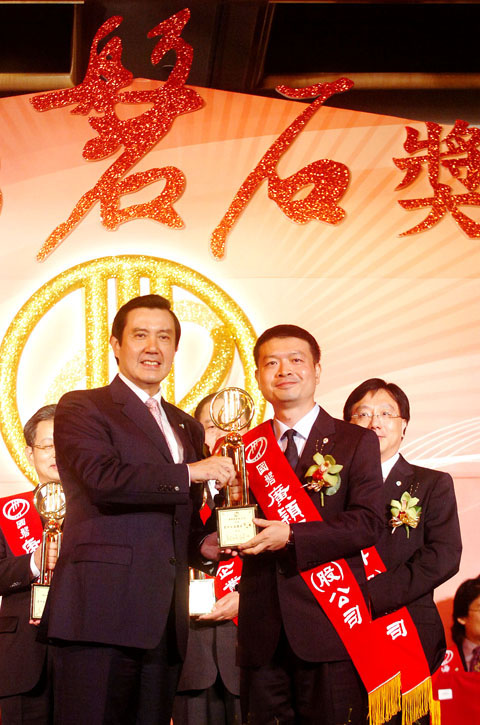Twelve local small and medium-sized enterprises (SMEs) and six overseas Taiwanese businesses yesterday received National Awards for their outstanding performance from the Ministry of Economic Affairs yesterday.
Among the 12 winning SMEs were Sheh Fung Screws Co (世豐螺絲廠公司), Hightech Electronic Products Tech Co (東林科技) and Tung Yu Hydraulic Machinery Co (東繁油壓機械).
During his opening remarks, Minister of Economic Affairs Yiin Chii-ming (尹啟銘) vowed that the government would provide SME credit guarantees of up to NT$6 billion (US$184.2 million) next year while boosting loans to SMEs to NT$300 billion a year, which is equivalent to one-tenth of the nation’s total NT$3 trillion loan balance.

PHOTO: GEORGE TSORNG, TAIPEI TIMES
President Ma Ying-jeou (馬英九) yesterday lauded the resilience of domestic SMEs, which he called a pillar to social stability.
Ma said, that there were 1.24 million SMEs in Taiwan, which account for 98 percent of all businesses here and take up 77 percent of the nation’s labor force.
He also reiterated confidence in the economy, saying the nation’s fundamentals were sound despite the global financial turbulence.
Taiwan has US$250 billion in foreign reserves and more than US$12,000 in GDP per capita, which lags only behind Hong Kong and Singapore in Asia.
The six overseas award-winning companies are Dental Implant Institute (美國拉斯維加植牙醫學中心), Asian Legend Inc (味香村連鎖飲食企業集團), Lightel Technologies Inc (萊特爾科技), Dallas/Fort Worth Technology Inc (美國達福科技), Chiu-Nichi Agro Resources Phil, Inc (綠源農業資源) and Telamon Corp (德利盟).

AI BOOST: Although Taiwan’s reliance on Chinese rare earth elements is limited, it could face indirect impacts from supply issues and price volatility, an economist said DBS Bank Ltd (星展銀行) has sharply raised its forecast for Taiwan’s economic growth this year to 5.6 percent, citing stronger-than-expected exports and investment linked to artificial intelligence (AI), as it said that the current momentum could peak soon. The acceleration of the global AI race has fueled a surge in Taiwan’s AI-related capital spending and exports of information and communications technology (ICT) products, which have been key drivers of growth this year. “We have revised our GDP forecast for Taiwan upward to 5.6 percent from 4 percent, an upgrade that mainly reflects stronger-than-expected AI-related exports and investment in the third

Mercuries Life Insurance Co (三商美邦人壽) shares surged to a seven-month high this week after local media reported that E.Sun Financial Holding Co (玉山金控) had outbid CTBC Financial Holding Co (中信金控) in the financially strained insurer’s ongoing sale process. Shares of the mid-sized life insurer climbed 5.8 percent this week to NT$6.72, extending a nearly 18 percent rally over the past month, as investors bet on the likelihood of an impending takeover. The final round of bidding closed on Thursday, marking a critical step in the 32-year-old insurer’s search for a buyer after years of struggling to meet capital adequacy requirements. Local media reports

TECHNOLOGICAL RIVALRY: The artificial intelligence chip competition among multiple players would likely intensify over the next two years, a Quanta official said Quanta Computer Inc (廣達), which makes servers and laptops on a contract basis, yesterday said its shipments of artificial intelligence (AI) servers powered by Nvidia Corp’s GB300 chips have increased steadily since last month, should surpass those of the GB200 models this quarter. The production of GB300 servers has gone much more smoothly than that of the GB200, with shipments projected to increase sharply next month, Quanta executive vice president Mike Yang (楊麒令) said on the sidelines of a technology forum in Taipei. While orders for GB200 servers gradually decrease, the production transition between the two server models has been

ASE Technology Holding Co (日月光投控), the world’s largest integrated circuit (IC) packaging and testing supplier, yesterday announced a strategic collaboration with Analog Devices Inc (ADI), coupled with the signing of a binding memorandum of understanding. Under the agreement, ASE intends to purchase 100 percent shares of Analog Devices Sdn Bhd and acquire its manufacturing facility in Penang, Malaysia, a press release showed. The ADI Penang facility is located in the prime industrial hub of Bayan Lepas, with an area of over 680,000 square feet, it said. In addition, the two sides intend to enter into a long-term supply agreement for ASE to